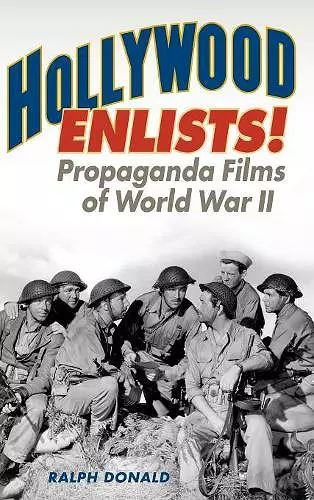Hollywood Enlists!
Propaganda Films of World War II
Format:Hardback
Publisher:Rowman & Littlefield
Published:8th Mar '17
Currently unavailable, and unfortunately no date known when it will be back

Frequently referred to as “the Greatest Generation,” Americans of the World War II era were influenced by Hollywood’s depictions of their nation, its role in world affairs, and the virtue of its involvement in the war. Stories of the bravery and heroism of the American military—as well as the moral and political threat posed by the enemy—filled movie screens across the country to garner passionate support for wartime policies. In Hollywood Enlists! Propaganda Films of World War II, Ralph Donald explores how the studios supported the war effort and helped shape the attitudes of an entire generation. Through films the studios appealed to the public’s sense of nationalism, demonized the enemy, and stressed that wartime sacrifices would result in triumph. The author contends that American films of the period used sophisticated, but often overlooked, strategies of propaganda to ideologically unite the country. While these strategies have long been associated with political speeches and writings during the war, little in-depth consideration has been given to their use in the era’s cinema. By examining major motion pictures—including Casablanca, The Flying Tigers, Mrs. Miniver, Sergeant York, They Were Expendable, and many others—Donald illustrates how various propaganda techniques aligned the nation’s entertainment with government aims. Hollywood Enlists! will appeal to readers with interests in war films and motion picture history, as well as politics and social history.
Donald (Women in War Films), a mass communications professor emeritus at Southern Illinois University, Edwardsville, returns to a subject he knows well: war films. This study examines propaganda within Hollywood fiction feature films produced during and related to American involvement in WWII. This specific focus omits documentaries, newsreels, and cartoons. After an opening chapter discussing the relationship between the American government and the film industry, Donald breaks down five 'appeals,' categories of Hollywood propaganda. These include the 'guilt appeal,' which stressed that the enemy was the aggressor and dragged our peaceful nation into war; the 'Satanism appeal,' wherein the enemy is defined through negative, dehumanizing characteristics; the 'illusion of victory appeal,' which assures that our victory is predetermined; the 'apocalyptic/Biblical appeals,' the former being a direct invocation of the Biblical books of Revelations and Daniel, and the latter a more general 'God is on our side' message; and the 'territorial appeal,' meant to convince the public that the country itself is at risk.... [This book has] ... some intriguing ideas. * Publishers Weekly *
In the late 1930s, Congress, much of the American public, and Hollywood (with the exception of Warner Bros. studio) remained skeptical of foreign entanglements, instead favoring an isolationist 'America first' policy. After Pearl Harbor, encouraged by President Franklin D. Roosevelt to persuade and entertain the American public, studios churned out hundreds of wartime propaganda films. This 'critical chronicle' shows how Hollywood’s often crude but effective feature films defined the bad guys, called to defend the homeland, and claimed God’s support and the inevitability of an Allied victory. The military provided advice, equipment, and officer commissions to many studio bosses. An unsavory aspect of these films was the flagrant racial and ethnic stereotyping—Germans were unfeeling, the Japanese were almost subhuman. (However, Nazi Germany led the way with films that scorned Jews.) Donald categorizes these films by propaganda techniques and concludes that the wartime mind-set continues to influence America’s worldview. VERDICT .... [S]olidly researched[.] * Library Journal *
Propaganda by definition is the use of mass media to call an audience to action. Although it has an evil connotation, it's also been used to educate and motivate target groups about important causes. Between 1941 and 1945, Hollywood produced hundreds of films intended to unify the country for the war effort. In addition to feature films, movie studios turned out training footage, newsreels, and fundraisers. Focusing on the feature films, Donald uses the five appeals of propaganda (guild, satanism, illusion of victory, biblical, territorial) to analyze and categorize more than 50 of these movies. The author lists the tenets for each appeal and then uses examples from these movies. The author lists the tenets for each appeal and then uses examples from these movies as illustrations. For example, Donald uses the plot and dialogue from Casablanca to demonstrate how guilt motivates Humphrey Bogart's character, Rick Blaine. Movie buffs will love the detailed references, but others may be more inclined to sample the entries. Of particular interest is the annotated list of analyzed films, which includes plot summaries, film information, and propaganda appeals. This is a handy volume for film collections. * Booklist *
ISBN: 9781442277267
Dimensions: 238mm x 160mm x 22mm
Weight: 517g
274 pages